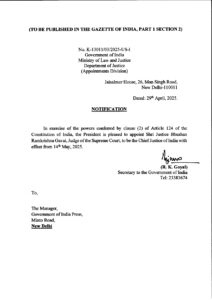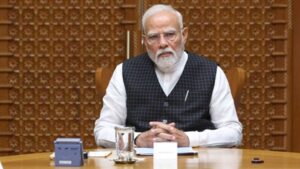“White Paper is serious document, everything is with evidence,” Sitharaman slams opposition parties in LS
New Delhi [India], February 9 (ANI): Finance Minister Nirmala Sitharaman on Friday said that the ‘White Paper on Indian Economy’ tabled by the government in Parliament was a “serious document” and reflects the dedicated efforts of the BJP-led government to bring the economy “back on rails” after 10 years of “economic mismanagement” of the UPA government.
Replying to the debate on the White Paper in Lok Sabha, Sitharaman talked of the steps taken by the Modi government to boost self-reliance in defence and expedite environmental clearances for faster economic development.
“I challenge anyone who says this document is baseless. Everything is with evidence. I challenge anyone who says that we have kept the White Paper which has no proof,” she said amid interruptions by opposition members.
“The White Paper is a serious document for documentary evidence for everything that is said in it and prepared with an intention of informing the House of the 10 years’ dedicated effort to get the government work in such a way that the economy is back on rails and also progress in such a way that our aspirations can be met,” she added.
The White Paper, comparing 10 years of economic management of the Congress-led UPA government with that of the Modi government, was tabled in Parliament on Thursday.
RSP leader NK Premachandran slammed the government, saying the government was apprehensive of the electorate in the forthcoming Lok Sabha elections and had brought the White Paper to blame the UPA government for its failures.
He said the government was afraid of “exponential growth in unemployment and spiralling price rise” and urged members to disapprove the motion brought by the government.
He urged them to approve the substitute motion brought by him.
The White Paper said that when the BJP-led government formed in 2014, “the economy was in a fragile state, public finances were in bad shape, there was economic mismanagement and financial indiscipline, and there was widespread corruption”
” It was a crisis situation. The responsibility to mend the economy step by step and to put the governance systems in order was enormous. Our government refrained from bringing out a white paper on the poor state of affairs then. That would have given a negative narrative and shaken the confidence of all, including investors. The need of the hour was to give hope to the people, to attract investments, both domestic and global and to build support for the much-needed reforms. The government believed in ‘nation-first’ and not in scoring political points…
“Now that we have stabilised the economy and set it on a recovery and growth path, it is necessary to place in the public domain the seemingly insurmountable challenges – left behind as a legacy by the UPA Government,” the White Paper said.






